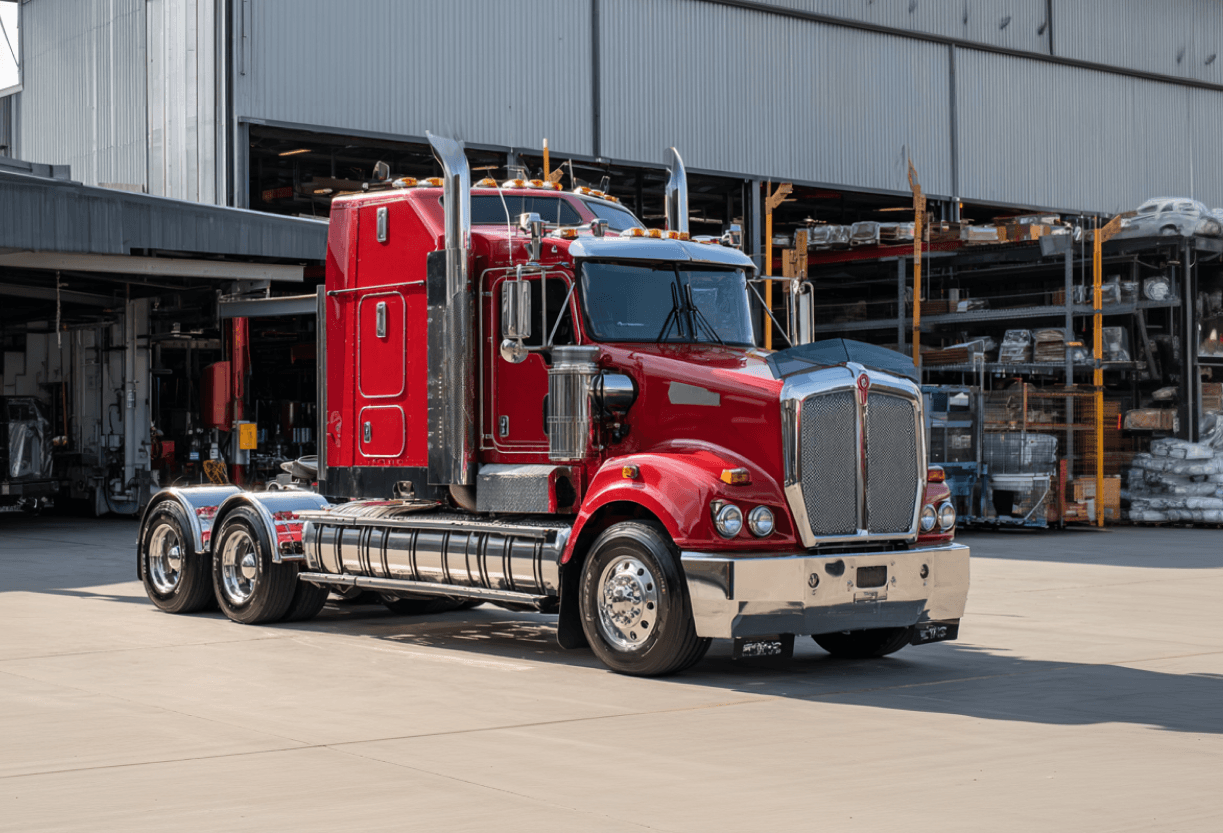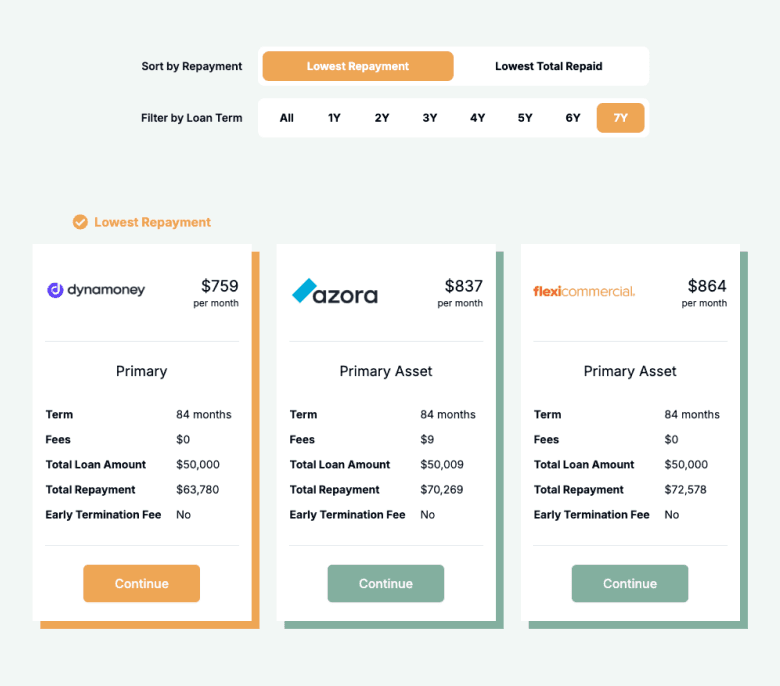Compare Heavy Vehicle Finance from 50+ Australian Lenders
Finance prime movers, rigids, tippers and buses with flexible structures like chattel mortgage, hire purchase or finance lease. Sharp rates, fast approvals.
5.0 rating


Heavy Vehicle Finance Made Simple
From linehaul to civil works, the right truck or bus keeps contracts moving. Finance tailored to cash flow, utilisation and asset life.
Borrow With Confidence
From $30,000 up to $1,000,000+ depending on profile and asset
Flexible Terms
1 to 7 year terms with optional balloons/residuals
Fast Approvals
Same-day decisions possible for eligible applications
New or Used
Dealer, auction or private sales supported
Tax-Smart Structures
Chattel mortgage, hire purchase, finance lease
Fit-outs & Bodies
Finance bodies, cranes, fridges, hydraulics and telemetry
How it works
We match your application to lenders that specialise in heavy vehicles so you can compare options with confidence.
Apply online in 3 minutes
Share business details, vehicle specs and budget.
See matched options
Our Lender Match compares structures, rates and terms side-by-side.
Upload documents
Provide ID, ABN/GST and bank statements (financials for higher limits).
Settle & collect
We coordinate with the seller/body builder so you can get on the road sooner.

A quick guide to heavy vehicle finance
Heavy vehicle finance helps Australian transport, civil and resources businesses acquire trucks and buses without draining working capital. Common structures include chattel mortgage (ownership from day one), commercial hire purchase (ownership transfers at the end) and finance lease (use during the term with a residual). Pricing and limits depend on turnover, time in business, credit health and asset specs (age, kilometres/hours, body and purpose). Balloons/residuals can lower repayments to match asset life and contract cash flow. Whether you’re adding a prime mover for interstate work or fitting a tipper for quarry runs, the right structure keeps cash flow predictable.
Want to skip ahead?
This guide is broken down into the following sections. Click a link if you want to skip ahead.
Types of heavy vehicle finance
Choose a structure aligned to ownership, tax treatment and cash flow:
What can I use heavy vehicle finance for?
Finance can cover the base vehicle and many specialist bodies or attachments.
Prime Movers & Linehaul
Add or upgrade prime movers for interstate and B-double work; finance telematics and aero kits.
Tippers & Dump Trucks
Rigid tippers and dog trailers for quarry, civil and aggregate runs; include hydraulics and bodies.
Crane & Hook-Lift Trucks
Install cranes, hook-lifts or tail-lifters for construction and waste applications.
Refrigerated Rigids
Chill/freezer bodies for food and pharma logistics with compliant insulation and refrigeration units.
Waste, Vacuum & Tankers
Compactors, vacuum trucks and water carts configured for councils, mining and site services.
Bus & Coach
Route buses, school buses and coaches, including seat fit-outs and accessibility options.
Case Study

Renee P, North-South Linehaul Pty Ltd
Lower repayments with a well-sized residual
Industry: Linehaul Transport
Challenge: Needed a late-model prime mover without stretching monthly cash flow during shoulder seasons.
Solution: Finance lease, 60-month term with a 30% residual aligned to expected resale value.
A Brisbane transport operator financed a Euro 6 prime mover. By choosing a finance lease with a 30% residual, monthly repayments stayed lean while the business kept capital for fuel and tyres. Based on historical resale, the residual is expected to be largely cleared at term end, simplifying upgrades.
How much can I borrow with heavy vehicle finance?
Typical facilities range from $30,000 to $1,000,000+ per asset. Limits depend on turnover, trading history, contract pipeline, and the vehicle’s age/specs. Many lenders fund up to 100% of purchase price for newer assets (plus body/fit-out); older or highly specialised units may have lower LVRs and shorter terms.
Heavy Vehicle Finance Repayment Calculator
Estimate repayments and total cost. Adjust the amount, term, rate and balloon to plan cash flow before you apply.
Balance over time
Am I eligible for heavy vehicle finance?
Lenders focus on serviceability, trading stability and asset suitability. Newer, lower-kilometre vehicles and reputable body builders usually attract sharper pricing. Contracted work and healthy bank statements improve approval odds.
You may be eligible if you are:
An Australian business with active ABN (GST preferred for larger limits)
Over 18 years old
Trading for 12+ months (start-ups considered case-by-case with evidence of contracts)
Consistent monthly turnover and clean credit history
Purchasing an eligible asset (prime mover, rigid, tipper, tanker, bus/coach)
How to apply for heavy vehicle finance?
Apply online in minutes. We’ll compare offers across chattel mortgage, hire purchase and lease options, then coordinate settlement with the dealer or body builder.
Documents you may need:
ABN and GST details
Photo ID (driver’s licence or passport)
Business bank statements (3–6 months)
Tax returns/BAS for larger limits
Vehicle specs (VIN, rego, build sheet/quote) and any contract evidence
How to save money on heavy vehicle finance
Compare structures—not just rates—as tax treatment and cash-flow outcomes differ. Size the residual/balloon to match realistic resale values and kilometres/hours. Bundle bodies and fit-outs (cranes, fridges, hydraulics, telemetry) at settlement so they’re financed at the same rate. Newer, fuel-efficient models often qualify for sharper pricing and lower whole-of-life costs.
Example: Residual impact — $180,000 over 60 months at 8.49% p.a.:
| Residual/Balloon | Approx. Monthly Repayment | Notes |
|---|---|---|
$0 | $3,692 | Highest monthly cost |
10% ($18,000) | $3,450 | Lower monthly cost |
20% ($36,000) | $3,208 | Balanced cost vs cash flow |
30% ($54,000) | $2,967 | Lowest monthly cost; plan resale/refinance at term end |
Understanding heavy vehicle finance options
Set up finance to suit ownership goals, upgrade cycles and budgeting certainty.
Secured vs Unsecured
Most heavy vehicle loans are secured against the asset for sharper rates; unsecured options cost more and have lower limits.
Residual/Balloon Payments
Lower monthly costs by deferring a lump sum to the end—payout, refinance or trade at term.
Fixed vs Variable Rates
Fixed gives certainty for budgets; variable may save if market rates fall, but adds rate risk.
Early Repayment Flexibility
Some lenders allow early payout or extra repayments; others charge break fees—check before you sign.
Fit-outs at Settlement
Bodies, cranes, fridges and hydraulics can often be financed alongside the base vehicle.
Testimonials
Verified Review
Brad was great, honest, responsive and on the ball, thanks for your help :)
Chantelle F.
Verified Review
I got my car loan approved within very short period of time , Bindia is very cooperative and friendly, and always gives right financial advice. Highly recommended.
ankur p.
Verified Review
I've worked with Brad from Emu Money a few times now, and I highly recommend. Brad is very responsive to emails (even when on holiday in Fiji), keeps me up to date and gets everything organised very quickly. Brad spoke directly with my supplier and they figured everything out. I won't hesitate to work with Brad again.
Christine F.
Verified Review
We recently purchased a vehicle. Peter was very helpful, with clear instructions and real outcomes. Within 48 hrs the deal was done, only 3-5 emails, a couple of phone calls. That was a super efficient experience. We would go back!
Kishan K.
Verified Review
I had such a great experience with Evette when sorting out my car loan. She made the whole process really easy and stress-free, was always quick to answer any questions, and genuinely cared about getting me the best outcome. Super friendly and professional. I'd happily recommend Evette to anyone looking for a car loan!
Dillon F.
Verified Review
Very humble and respectful
Kazim A.
Frequently Asked Questions
Heavy Vehicle Finance FAQs
These helpful FAQs will help you find the answers you need. If you can't find what you're looking for, you can request a callback below.







































































